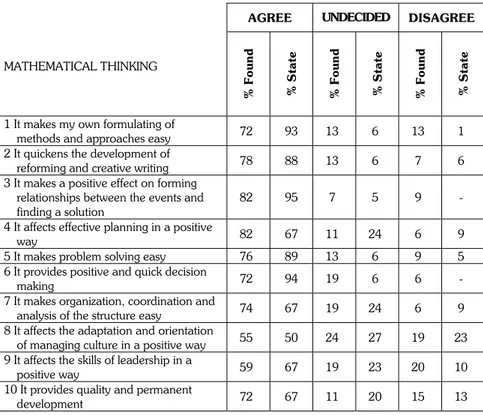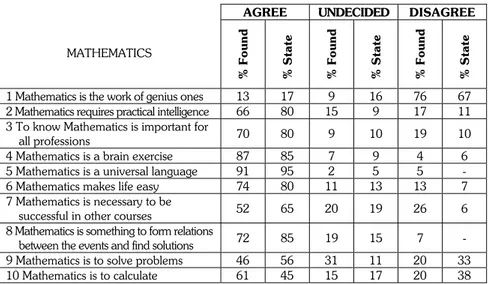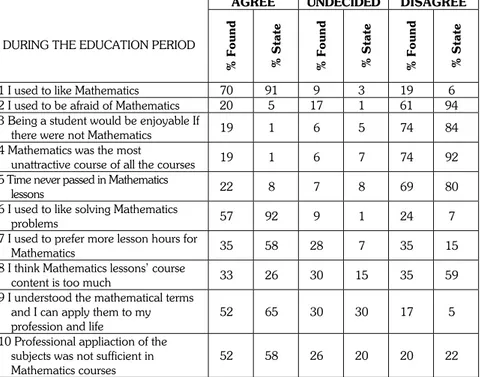Mathematical Thinking on Managing Director
Candidates
∗Assist.Prof.Dr. Akın MARŞAP∗∗
Prof.Dr. Zeynep Fidan KOÇAK∗∗∗- Prof.Dr. Nesrin ÖZSOY∗∗∗∗
Abstract: Managing directors, and the people who take place in
managing branches, have to improve their managing methods and ways related to capital, equipment and other sources in a continuous and systematic manner. To have permanent personal development of managing directors through out their lives is quite possible by bringing out their life philosophy clearly. By providing the managing directors with personal managing discipline, the development processes will be more systematic and reasonable and therefore, they will be able to re-alize their personal targets in a sound manner. Positive effects of mathematical thinking that they got through mathematics education will be too many in order to reach their targets in a sound manner. In this project, in order to do research on mathematics knowledge that will enable the managing director candidates to have higher perform-ances, their ideas about mathematics and effects of mathematical thinking they got during their education on their managing, reforming, leadership and creative skills, a three phase questionnaire with 30 questions were submitted to 3rd and 4th year students in one
founda-tion and one state university in Ankara in Turkey. The results have been evaluated and their percentages have been shown.
Key Words: Mathematical thinking, management mathematics,
mathematical mind
I. Introduction
The objective of this project is to test on the sufficiency of the mathematics courses and methodologies used in the mathematics courses in the manage-ment faculties at the universities’, through getting the ideas of the managing
∗
This article was presented at the Mathematics Symposium on the 5th of May 2004 in Ankara
∗∗
University of Ahmet Yesevi, TURTEP Department of Management akin.marsap@yesevi.edu.tr
∗∗∗
University of Muğla, Faculty of Arts and Sciences zkocak@mu.edu.tr
∗∗∗∗
University of Adnan Menderes, Faculty of Education nesrinozsoy@adu.edu.tr
director candidates on mathematics, sufficiency and necessity of mathematics courses, whether the knowledge and experience they got through mathematics education is useful for them as managing director candidates or not.
Within this purpose, a questionnaire with 30 questions has been applied to some groups chosen from the managing director candidates and the results have been analyzed in terms of candidates’ managing and improvement techniques, and effects of mathematical thinking on their reforming man-ager, leadership and creative skills and their attitudes towards mathematics have been evaluated.
It should be known that mathematics improves thinking. For this reason, mathematics education forms the most important part of the basic educa-tion. Mathematics education enables us to stand on our feet in the life strug-gle, enables us to think, to form relations among the events, to be rational, to guess, to solve problems rather than just calculating (Umay 2003:234-243). Mathematics is described as a nightmare by the management department students, the reason that our students do not like mathematics is that the right point of view of mathematics is hidden from them (King 1997). Most of our students think that they are not able to understand mathematics’ abstract and complex logic. However, mathematical mind has perhaps nothing much to do with the ability of numerical accounting and algebraic formulas and solving too many abstractions
French mathematician and philosopher J. Henry Poincare states that mathe-matics is an aesthetic sensitivity that should be learned not only by mathematicians and philosophers, but also by the people who have been educated in different fields (King 1997). Some of the general objectives of
mathematics teaching are to teach the importance of mathematics by emphasizing the positive attitudes towards mathematics through pointing out
the aesthetic and fine quality of mathematics (Pesen 2002:130-134). Preston has found out that anxiety of mathematics is related to the choice of jobs. In his research, seen that, the more the anxiety of mathematics is, the less abil-ity of mathematics is (Preston 1987). Betz has found out that the universabil-ity students who are weak at mathematics are more worried about mathematics and they have negative attitudes towards mathematics (Betz 1978:441-448). In 1982, university students’ mathematics anxieties were evaluated was un-derstood that the students who had a higher rate of mathematics anxiety chose literature departments and other students with a less rate of mathe-matics anxiety chose science departments. In conclusion, it has been found out that mathematics anxiety and negative attitudes towards mathematics make the students escape from mathematics (Erol 1990).
It is seen that anxiety of mathematics attitudes towards mathematics and the role of mathematics in choosing the managing jobs have been analysed on the managing director candidates.
If we accept that “mathematics is the formulation of the relations among the events and finding solutions”, we can think that we make mathematics in every moment of our lives. Mathematics is a universal language. For years, lots of civilizations and languages have died but mathematical ideas have remained (Hardy 1993).
2. Methodology
This research has been applied to the students Ankara, at Atılım University
in the Faculty of Management, and at Gazi University in the Faculty of Management in three parts;
1) The effects of mathematical thinking on their managing, reforming and creative sides,
2) Ideas about mathematics,
3) The sufficiency and necessity of mathematics knowledge that they got through their university education.
This questionnaire has 30 questions and it was prepared by 3 researchers by consulting with experienced educators and applied by their teachers.
The results have been given in chart with the percentages and have been interpreted. The opinions and points of views of state and foundation uni-versities have been compared and contrasted.
3. Findings
Reasoning is the process of considering and thinking all the elements carefully and reaching a logical result. Mathematics is one of the most important means of improving reasoning. Mathematics is the field in which reasoning is used widely (Preston 1987). We are glad that the candidates agree on these matters as is understood from their answers in the questionnaire that is prepared within these ideas. As is seen in the table the percentage of “Agree” is high and it shows that the managing director candidates are aware that mathematical thinking and reasoning is important in their jobs. In the 1st , 2nd and 3rd
ques-tions, the percentage of “Agree” is high for both groups and the percentage of “Undecided” and “Disagree” is low and it shows that the definition of mathe-matics is understood well and applied well. It is in harmony with the results in Table 2. If we compare the state and foundation universities, we see that state university students’ “Agree” percentages is higher and it is also seen that state universities’ “Disagree” percentages are low. It is surprising that in the 7th 8th 9th
number of the director candidates who think that they can have organization,
coordination, harmony, orientation they can improve the quality without making use of mathematical thinking and without the ability of reasoning is
higher than expected. The results are shown in Table 1.
Table 1. Mathematical Thinking
AGREE UNDECIDED DISAGREE
MATHEMATICAL THINKING % Found % State % Found % State % Found % State
1 It makes my own formulating of
methods and approaches easy 72 93 13 6 13 1
2 It quickens the development of
reforming and creative writing 78 88 13 6 7 6
3 It makes a positive effect on forming relationships between the events and finding a solution
82 95 7 5 9 - 4 It affects effective planning in a positive
way 82 67 11 24 6 9
5 It makes problem solving easy 76 89 13 6 9 5 6 It provides positive and quick decision
making 72 94 19 6 6 -
7 It makes organization, coordination and
analysis of the structure easy 74 67 19 24 6 9
8 It affects the adaptation and orientation
of managing culture in a positive way 55 50 24 27 19 23 9 It affects the skills of leadership in a
positive way 59 67 19 23 20 10
10 It provides quality and permanent
Table 2. Mathematics
AGREE UNDECIDED DISAGREE
MATHEMATICS % Found % S tate % Found % S tate % Found % S tate
1 Mathematics is the work of genius ones 13 17 9 16 76 67 2 Mathematics requires practical intelligence 66 80 15 9 17 11 3 To know Mathematics is important for
all professions 70 80 9 10 19 10
4 Mathematics is a brain exercise 87 85 7 9 4 6 5 Mathematics is a universal language 91 95 2 5 5 - 6 Mathematics makes life easy 74 80 11 13 13 7 7 Mathematics is necessary to be
successful in other courses 52 65 20 19 26 6
8 Mathematics is something to form relations
between the events and find solutions 72 85 19 15 7 - 9 Mathematics is to solve problems 46 56 31 11 20 33 10 Mathematics is to calculate 61 45 15 17 20 38
Known as an abstract discipline, mathematics has always frightened and the people interested in mathematics have always been respected. In the Table 2, although the percentages is high, it would be expected that the percent-ages of the people who said “Agree” and “ Undecided” would be lower. We accept that mathematics teachers should teach that every child is intelligent and everybody who can think can learn mathematics easily. To be a mathe-matician is a different issue. The percentage of “Agree” is high in the 2nd
question. What is mathematics? This question has always been asked. Even the people who have dealt with mathematics for long years had difficulty in defining mathematics and could only point out some characteristics of it. It is widely accepted that mathematics is a universal language. The answers given to the 5th question show that the director candidates agree on this.
Higher percentage of “Agree” in the 4th 6th and 8th questions show that, the
director candidates are conscious about the definition of mathematics. Although the people who say “ Mathematics is necessary to be successful in
other courses” is higher than % 50, high percentage of “disagree” is disturbing. It is good to have a high percentage of “agree” in the 8th question. The
per-centage of “agree” is equal to the perper-centage of “Disagree and undecided” in the 9th and 10th questions. The main objective of mathematic is to improve
mathematical thinking and reasoning rather than just solving problems and making calculations. As seen in the Table 2, there are not too many differences between the director candidates attending to state universities and the director
It is seen in the Table 3 above that, mathematics is accepted to be a difficult and an unattractive lesson by most of the people. However, If mathematicians could bring out the aesthetic good and artistic side of mathematics, mathematics would be more likeable and attractive and would be understood easily (Erol 1990). Mathematics teachers efforts have not been in vain. Although the percentage of the foundation university director candidates is lower than the percentage of the state university director candidates, the answers of the 1st question show that
mathematics is liked. When the answers of the 2nd question is evaluated, it is found
out that, state university director candidates are afraid of mathematics % 20 and they cannot decide % 17, according to this result some precautions should be taken. The answers given to the 3rd and 4th questions show the consistency of the
director candidates. The answers given to the 6th question show that foundation
university director candidates do not like to solve problems, on the other hand, most of the director candidates attending the state universities enjoy solving problems. Lesson hours and contents can be accepted as suitable when the answers of the 7th and 8th questions are considered. It is also possible to point out
that, the definitions are not taught well and the professional applications are not sufficient if the answers of the 9th question are analysed.
Table 3. During The Education Period
AGREE UNDECIDED DISAGREE
DURING THE EDUCATION PERIOD
% Found % State % Found % State % Found % State
1 I used to like Mathematics 70 91 9 3 19 6 2 I used to be afraid of Mathematics 20 5 17 1 61 94 3 Being a student would be enjoyable If
there were not Mathematics 19 1 6 5 74 84
4 Mathematics was the most
unattractive course of all the courses 19 1 6 7 74 92 5 Time never passed in Mathematics
lessons 22 8 7 8 69 80
6 I used to like solving Mathematics
problems 57 92 9 1 24 7
7 I used to prefer more lesson hours for
Mathematics 35 58 28 7 35 15
8 I think Mathematics lessons’ course
content is too much 33 26 30 15 35 59
9 I understood the mathematical terms and I can apply them to my profession and life
52 65 30 30 17 5 10 Professional appliaction of the
subjects was not sufficient in
4. Conclusion and Suggestions
Having applied the questionnaires to the managing director candidates it is realized that these people are aware of the fact that mathematics is important and also necessary in order to be successful in their jobs and they have de-veloped positive attitudes towards mathematics in general and they are also conscious of the definition of mathematics. It has also been found out that the managing director candidates attending foundation universities are more indecisive and negative than the ones attending state universities. For this reason, precautions should be taken and efforts should be made to show the lovable and good part of mathematics so that they can develop more posi-tive attitudes towards mathematics. The answers given in Table 1, Table 2 and Table 3 are not contradicting with each other and the answers are in harmony. This harmony shows that the candidates have thought about the questions and answered them consciously.
After 1950, mathematics education became very important and the re-searches increased in the world. In Turkey, we notice the increase on the mathematics education with great happiness. In this project, since we do not have time and opportunities, model space is limited. We think that, if the same or similar research is done in a larger context, the results will be more sound. What is the role of mathematics in choosing managing profession? Both the Management students’ and the Engineering students’ attitudes towards mathematics can be researched in a larger space and time.
A similar research may be applied to the students who have higher positions
in the managing fields and the effects of mathematical thinking on the managing performances may be found out.
References
Betz, N.E., (1978), Prevalance Distribution and Correlates of Mathematics Anxiety in College Students, Journal of Counseling Psychology, 25 (5), 441-448. Erol, E., Öner, N., (1990), Mathematics Stress Anxiety: Success, Exam Anxiety and
Relation with Career Selection, 6nd National Psycology Congress.
Hardy, G.H., (1993), A Defense One of the Mathemathician, TÜBİTAK Publishment. King, J. P. ( 1997), Arts of Mathematics, TÜBİTAK Publishment.
Pesen, C. (2002), Based On Aesthetics of Mathemathics, Department of Education of University of Hacettepe 22, pp 130-134.
Preston, P.A. (19879, Mathemathics Anxiety: Relationships With Sex,College Major Mathematic Background, Math. Achievement, Math. Performance, Avoidence, Self Rating of Mathemathics Reliability as Measured by the Revised Math. Anxiety Scale, (RMARS).
Resnick, H., Viehe,J., Segal,S , (1982), Is Math. Anxiety a Local Phenomenon? A Study of Prevalance and Dimensionality, Journal of Counseling Psychology, 29 (1), 39-4.
Umay, A., (2003), Mathemathical Ability, Judgement Ability, Department of Education of University of Hacettepe, 24 , pp 234-243.
Matematiksel Düşüncenin Mesleğe Yönelik Etkileri
Yard.Doç.Dr. Akın MARŞAP∗∗
Prof.Dr. Zeynep Fidan KOÇAK∗∗∗ - Prof.Dr. Nesrin ÖZSOY∗∗∗∗
Özet: İşletme yöneticileri, işletmelerde yer alan insanlar, sermaye,
malzeme ve diğer kaynakları işletme yöntem ve yolların sürekli siste-matik bir biçimde geliştirmek durumundadır. İşletme yöneticilerinin ki-şisel gelişiminin yaşam boyu süreklilik kazanması, yaşam felsefesinin açık bir biçimde ortaya konulmasıyla olanaklı olmaktadır. İşletme yö-neticilerinin kişisel yönetim disiplinini sağlanması ile, gelişim aşamaları daha sistematik ve bilinçli biçimde sürdürülerek, amaçlanan bireysel hedeflere daha sağlıklı ulaşılabilecektir. Amaçlanan hedeflere sağlıklı ulaşabilmek için matematik eğitimi yoluyla edindikleri matematiksel düşüncenin olumlu katkısı çok olacaktır. Bu çalışmada; işletme yöneti-cisi adaylarının yüksek performansa ulaşmalarını sağlayabilecek ma-tematik bilgisini, mama-tematik hakkında görüşlerini ve eğitim süresince edindikleri matematiksel düşüncenin yönetici, yenilikçi, lider ve yaratı-cı yönlerine etkisini araştırabilmek için 3 aşamalı ve 30 soruluk anket, Ankara’da 1 vakıf üniversitesi, 1 devlet üniversitesinde İşletme Fakül-tesi 3. ve 4. sınıf öğrencilere uygulanarak sonuçlar yüzdelere dökülüp değerlendirilmiştir.
Anahtar Kelimeler: Matematiksel düşünme, işletme matematiği,
ma-tematiksel dikkat
∗
Bu makale 5 Mayıs 2004’de Ankara’da yapılan Matematik Sempozyumunda sunulmuştur. ∗∗
Ahmet Yesevi Üniversitesi, TÜRTEP İşletme Bölümü / ANKARA akin.marsap@yesevi.edu.tr
∗∗∗
Muğla Üniversitesi, Fen-Edebiyat Fakültesi / MUĞLA zkocak@mu.edu.tr
∗∗∗∗ Adnan Menderes Üniversitesi, Eğitim Fakültesi / AYDIN nesrinozsoy@adu.edu.tr
Ê osen# 2006 Ê výpusk: 39: 87-96


